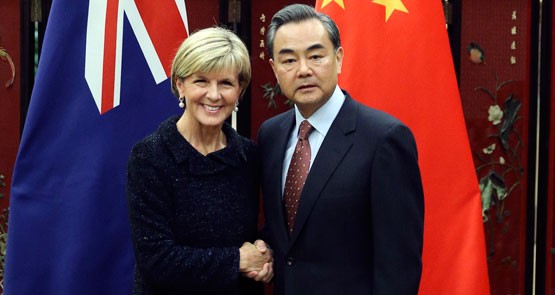
Foreign Minister Julie Bishop with Chinese Foreign Minister Wang Yi
Foreign Minister Julie Bishop’s testing times at the hands of senior China officials during her swing through north Asia during the past week, in preparation for Malcolm Turnbull’s first trip to the Middle Kingdom as Prime Minister, should surprise no one. And they have only just begun.
Despite the “frosty reception in Beijing” type headlines, in reality it was Bishop who has taken the tough message — the fight, if you like — to the increasingly bullying Chinese.
Since the the fall of the Berlin Wall, by and large, the job of Australia’s Foreign Minister has been one filled with travel, the dreary niceties of diplomacy, lots of box ticking and glad-handing and not too much controversy (excluding Indonesia).
But since China began to ramp up its military modernisation and made clear it wanted its old role of regional hegemon back — and soon — all that has begun to quickly change. Never in Australia’s 115-year history has the nation been faced with balancing its relationships that promote its economic interests and strategic goals so delicately. For the first time, Australia’s biggest trade and export partner is making increasingly aggressive moves against an increasing number of countries that are this country’s defence allies.
So Julie Bishop, like no other Australian chief diplomat in living memory, has been in the the hot seat — yet it’s a role she has seized with uncommon vigour since her (rude) stunning public dressing-down by Chinese Foreign Minister Wang Yi in 2013.
Wang is technically Bishop’s opposite number, but he is some way down the food chain in China’s arcane foreign affairs hierarchy; he doesn’t even make the country’s top 25 officials. Her offence was to buy into the then-nascent concept of no-fly zones over China’s vast and disputed maritime claims.
Australia has a dog in the South and East China Sea fight — the vast majority of our seaborne exports by value traverse the areas in the form of iron ore, coal, wool, other minerals and agricultural products headed for China, Japan and South Korea.
At the weekend Bishop echoed calls made by Turnbull and New Zealand PM John Key days earlier.
“A number of claimants have reclaimed land and constructed things, but the scope and scale and speed of China’s activities have dwarfed those of all others,” Bishop said.
Last week, China would not deny reports it had moved surface-to-air missiles to Woody Island in the South China Sea, reneging on claims made only last year that it would not militarise its constructed island. Surprise.
Just to make sure the Chinese got the point, Bishop visited Tokyo en route to China to discuss the ongoing submarine tender — in response, China bleated that Australia must not use Japan to construct its new subs.
Bishop has clearly been sent to play bad cop to deal with the (increasing number of) issues upon which Australia and China do not agree. The aim is to clear the decks for the PM’s triumphant April visit, in which the other half of her department, Trade, will lead the “biggest evah” business delegation to China.
Still the whole calculus will be thrown into chaos if a pre-budget early election is called amid the Coalition’s suddenly tumbling popularity. But the fact remains whichever side occupies the Treasury benches in Canberra — and tough-on-China comments from Labor defence spokesman Stephen Conroy suggest plenty of bipartisanship here — Australia now has a significant international relationship like none it has ever had to deal with before.
Australia and China have complementary economies, and the commercial relationship is unlikely to change radically any time soon, but diplomatically there are tougher times ahead. Already more ships from the Royal Australian Navy are sailing north, and more aircraft from the RAAF will be flying over disputed seas.
As Bishop has admirably demonstrated by her polite refusal to bend to Chinese pressure, she is the backbone in the Coalition’s China strategy and understands that the time for treating China differently to any other of our neighbours is well and truly past.








It would make a welcome change if Mr Sainsbury would acknowledge some basic facts.
First, the Chinese claim to territory in the south China Sea did not commence with the present Chinese government. The former Kuomintang Nationalist government published its claims in 1947.
Secondly, when it comes to “militarisation” of the region, that is not confined to China building upon some shoals and installing anti-aircraft missiles there. China is ringed by American bases which have the clear military intent of confronting China when it suits American geopolitical purposes to do so.
Thirdly, the flying over sensitive areas with US (and Australian) military aircraft is provocative and hardly consistent with Bishop’s professed wish for a negotiated settlement.
There is more that could be said, but the above makes the point that Mr Sainsbury should cease seeing everything through an American military prism.
If the Labor Party had more Politicians with Julie Bishop’s abilities we wouldn’t be out of Office so frequently, would we.
Sadly we have no shortage of those who see the world through similar quaint eyes to those of James O’Neill.
My apologies for Post #3, but the Crikey Commissariat blocks items so frequently that I assumed it had happened again. At least this time I was permitted to read it promptly, even if other subscribers were seen by the Censor as being in need of ‘protection’.
We really need to be terrified about China disrupting our trade routes to our…errr.. major customer.
All posturing – make a real point? No more sales of our sovereign land to chinese nationals or entities… How about a plebiscite on that…
Reminds me of the last yellow peril of japan in the 80’s till they ran out of money to buy our assets.
Australia – always looking to the future.